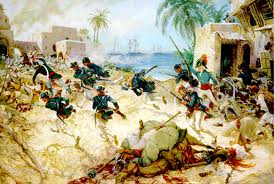
After the United States gained its independence in 1783 it became the new kid on the block and it started getting picked on almost immediately. One of the most formidable dangers the young country faced was the Barbary pirates. The Barbary pirates were pirates from the North African coast–mainly the state of Tripoli. The Tripolitanians raided American merchant ships in the Mediterranean. Crews were enslaved, goods stolen and ships captured. The new nation did not have a sufficient navy to defend their trade from these pirates. Tripoli demanded tribute. John Adams had declared that he would spend “Millions for defense, not one cent for tribute.” during the Quasi War with France. The principles he expressed were once again applied. Eventually in 1801, President Thomas Jefferson had had enough, he declared, “I know that nothing will stop the eternal increase from these pirates but the presence of an armed force.” The United States was going into its first official foreign war. Although most of the war was fought on sea between the fledgling US navy and the pirate ships of Tripoli there was one particular land battle that became an iconic event in American history: the battle of Derne. (To read about the burning of the USS Philadelphia by Stephen Decatur, another iconic event of the Barbary War, see my post titled, “The Most Bold and Daring Act of the Age”)
The battle of Derne was fought in 1805 between a group of American marines and their Arab and European allies and the forces of Tripoli in the coastal town of Derne, North Africa. The American-led coalition was commanded by William Eaton and was comprised of eight US marines, one US sailor and a band of European and Arab mercenaries. Eaton also had naval support from three American ships off the coast of Derne. The three ships: the Argus, Hornet and Nautilus were commanded by Samuel Barron. Two other American naval heroes were present at the battle as well: Oliver Hazard Perry of Lake Erie fame and Isaac Hull of “Old Ironsides” fame.
Eaton marched his army across the North African desert from Alexandria, Egypt and straight towards Derne. On April 26, Eaton demanded that the governor surrender. The governor replied, “My head or yours.” The next day, Eaton attacked. At first, the battle went slowly for the Americans. They were pinned down in the open by the furious fire from the city’s forts. Eventually, Eaton decided to risk everything and make a frontal assault. He sounded the charge and the Americans and their allies rushed forward. Eaton himself was wounded during the attack but he kept running. When the Americans reached the Tripolitanian fortifications they overwhelmed the enemy, seized one of the city’s forts and turned the tide of the battle.
With Derne in American hands the Tripolitanian ruler negotiated peace with the United States. America had been victorious in their first land battle on foreign soil. They had also proven that they were able to defend their independence and their hegemony on the high seas. The bully had been striking the US long enough–the Americans had struck back. After the treaty was signed Eaton evacuated Derne by nightfall to escape from the Arabs, who had expected that Eaton would help them overthrow the Tripolitanian bey. When they learned that Eaton and his men were leaving them they grew furious. Eaton and his men could hear their cursing from the harbor as they sailed away. The battle of Derne became famous and made its way into the Marines Hymn with the line “to the shores of Tripoli!”
